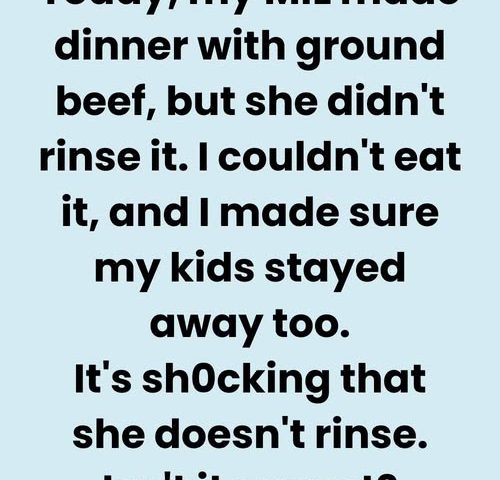Ground beef is a staple in many households, applied for burgers, tacos, pasta sauces, and more. While it is flavorful and versatile, it is also one of the most concerned meats when it comes to health. One popular question people ask is whether rinsing ground beef after cooking makes it healthier. Some believe rinsing helps decline fat and calories, while others argue it washes away nutrients and may not be worth the effort. Let’s discover the science behind this practice and how it may affect your health.
Why People Rinse Ground Beef
When ground beef is cooked, fat naturally renders out and collects in the pan. Many people drain this fat to cut down on calories and saturated fat intake. Some go a step further and rinse the beef under hot water after draining, hoping to get rid of even more fat. This method became common in the 1990s, especially for families trying to lower cholesterol and heart disease risk without removing beef from their diets.
Fat and Calorie Reduction

Studies have shown that rinsing cooked ground beef can significantly decline fat content. For example:
- Simply draining the fat from browned ground beef can reduce fat by about 30%.
- Rinsing with hot water after draining can reduce fat by as much as 50%.
This reduction in fat also lowers calorie content, which may benefit people trying to manage weight or enhance heart health. For instance, a three-ounce serving of ground beef that originally contains around 200 calories could drop closer to 150 calories when drained and rinsed.
Possible Nutrient Loss
While rinsing helps lower fat, it may also wash away water-soluble nutrients. Certain vitamins, such as B vitamins, are sensitive to water and heat. When beef is cooked, small amounts of these nutrients can be lost. However, the amount is relatively minor compared to the benefits of fat reduction. For people who already eat a balanced diet with plenty of fruits, vegetables, and whole grains, this nutrient loss is unlikely to cause harm.
Food Safety Concerns

Another crucial consideration is food safety. Some people wonder if rinsing beef under running water could expand bacteria around the sink area. However, rinsing typically occurs after cooking, when bacteria like E. coli and Salmonella have already been destr0yed by heat. As long as the meat is fully cooked to a safe temperature (160°F or 71°C), rinsing is not a major safety risk. Still, it is important to clean the sink and surrounding surfaces afterward.
Flavor and Texture Changes
Rinsing ground beef can sometimes affect the flavor and texture of the meat. Because fat carries much of the beef’s taste, eliminating too much of it may leave the meat slightly bland or dry. Some people add extra seasoning, broth, or sauce to restore flavor. In dishes like tacos, chili, or spaghetti, the difference is often less noticeable, making rinsed beef a practical choice for those centered on health.
Should You Rinse Ground Beef?

The answer relies on your health goals and preferences:
- If you want to lower fat and calories, rinsing is effective.
- If you prioritize flavor and juiciness, simply draining the fat may be enough.
- If you eat beef only occasionally, rinsing may not be necessary since overall intake matters more than one meal.
Final Thoughts
Rinsing ground beef is a normal kitchen trick that can make a meaningful difference for people concerned about fat intake. While it does slightly decline some nutrients and may alter the flavor, the benefits—especially for heart health and weight management—can outweigh the drawbacks. Ultimately, whether you rinse or not, balance and moderation are key.
